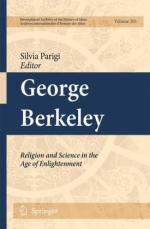|
This section contains 6,951 words (approx. 24 pages at 300 words per page) |

|
SOURCE: “Berkeley's Ideas of Sense” in The Empiricists: Critical Essays on Locke, Berkeley, and Hume, edited by Margaret Atherton, Rowman & Littlefield Publishers, Inc., 1999, pp. 89-106.
In the following essay, Cummins examines Berkeley's belief about perception, claiming that he limits himself because he refuses to separate the physical world from the perceptions of the senses.
In Section One of the Principles,1 Berkeley divides the objects of human knowledge into three groups. They are either “ideas actually imprinted on the senses, or else such as are perceived by attending to the passions and operations of the mind, or lastly ideas formed by the help of memory and imagination, either compounding, dividing or barely representing those originally perceived in the aforesaid ways.” Berkeley proceeds to specify, with respect to ideas of the first division, the qualities which are the proper objects of each of the five senses. By smell, for example...
|
This section contains 6,951 words (approx. 24 pages at 300 words per page) |

|


